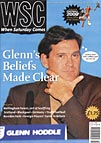 How one man attempted to bring his club down to flames, literally. Andrew Spiers and Ray Gilbert report
How one man attempted to bring his club down to flames, literally. Andrew Spiers and Ray Gilbert report
Ken Richardson, ex-benefactor (his choice of word) of Doncaster Rovers, was found guilty of conspiracy to commit arson by a unanimous verdict at Sheffield County Court in the last week of January. Judge Peter Baker said Richardson could expect a custodial sentence and he was remanded in custody pending a bail hearing. Sentencing was delayed as his barrister was ill.
All of this has come as good news to Doncaster fans at the end of a very enjoyable week. It started with a 3-1 win at Conference big-spenders Rushden and Diamonds and ended with the defeat of Conference leaders Kettering, 1-0 away. Even the announcer at Kettering added to the carnival atmosphere with a message from the fans for “an absent Mr Richardson who couldn’t be with us today” before playing Firestarter by the Prodigy.
For a long time Richardson has stressed his innocence and stated that he loved football and the club – a claim that was repeated in court. His evidence was called “the worst concoction of waffle, piffle and flannel that I have ever heard” by the prosecution barrister, Roger Keen QC. Richardson’s fellow conspirators had long ago pleaded guilty to breaking into the ground and dousing the interior of the stand with petrol. A fire brigade officer said in evidence that the smell of petrol had been overpowering and that there was a serious danger of loss of life. “It was,” he says, “a very serious fire.”
This particular stench isn’t confined to Doncaster. It is now time that the game had its own fire brigade in the shape of a regulatory body with a monitoring and compliance capability powerful enough to stop those who would abuse football clubs and their fans. Addressing a Task Force meeting last year, Doncaster fans argued the case for having a code of conduct for football and for a governing body possessing the power to do something about breaches of such a code. Reports on corporate governance now recommend that any director about to join a company’s board should be “a fit and proper person for that office”. Let’s have that applying to football clubs. Richardson may never have been a director – in fact he once threatened the Yorkshire Post with legal action if they ever referred to him as the chairman – but was clearly the man in charge.
The FA should draw up a binding set of rules to prevent clubs from being bought for small sums of money and then sold on for an outrageous amount (as in the case of Brighton) and which prevent people who have inflicted damage on one football club being allowed to run another. With the help of the FA, clubs can be bought back from the speculators who look at football grounds and see only the land they are built on. In court, the prosecution took the view that Richardson was at Doncaster Rovers to make a financial killing out of what had become a valuable piece of real estate. The fans had long ago come to that same conclusion.
The chairman and assistant secretary of Doncaster Supporters Club were in court when the jury gave its verdict. When they went back to their cars parked near the court, they found their tyres had been let down. What a happy time we’ve had.
From WSC 145 March 1999. What was happening this month